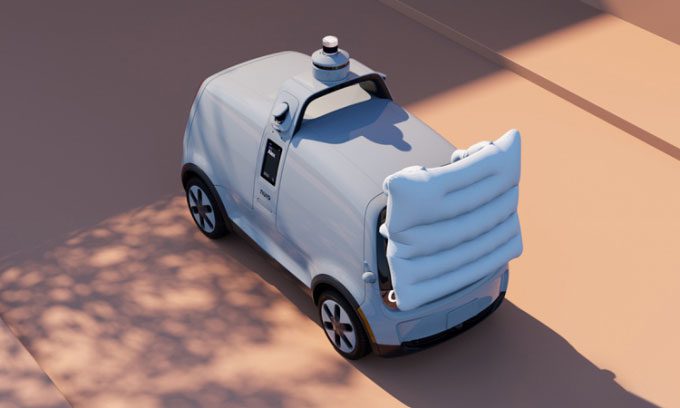In addition to its unique airbag, the new delivery vehicle from Nuro also runs on clean energy and has temperature control in its cargo area.

Nuro’s new generation autonomous vehicle equipped with pedestrian airbags. (Photo: Nuro)
Nuro, a U.S.-based startup, introduced its third-generation autonomous delivery vehicle featuring an external airbag designed for pedestrian collisions, New Atlas reported on January 13. The company has not provided detailed specifications, but the new vehicle is likely to use the same types of LiDAR, radar, 360-degree cameras, and ultrasonic sensor technologies as its predecessor.
The new vehicle will operate faster than the previous generation, reaching speeds of up to 72 km/h. However, when pedestrians are nearby, it may significantly reduce its speed. In the event of an unexpected situation where a direct collision is imminent, the external airbag will deploy to reduce impact force. The actual effectiveness of this new solution remains unclear and may depend heavily on the vehicle’s speed at the time of impact.
Nuro stated that its vehicles utilize 100% renewable energy sourced from wind farms in Texas. The materials used in the vehicle’s construction also adhere to strict standards regarding sourcing and supply chains to protect the natural environment. Additionally, the vehicle is designed for use in all weather conditions.
The new autonomous delivery vehicle can carry over 220 kg of goods. It is equipped with a modern heating, ventilation, and air conditioning system that allows temperatures to be cooled down to -6 degrees Celsius or heated up to 47 degrees Celsius, depending on the type of cargo. Customers will interact with the vehicle through a large touchscreen display onboard.
The autonomous vehicle with airbags is expected to be manufactured at the company’s production facility in Nevada, which is still under construction. The vehicle’s drivetrain, including the electric motor and battery, will be produced by BYD’s North American branch. The factory is anticipated to officially commence operations by the end of this year.


















































